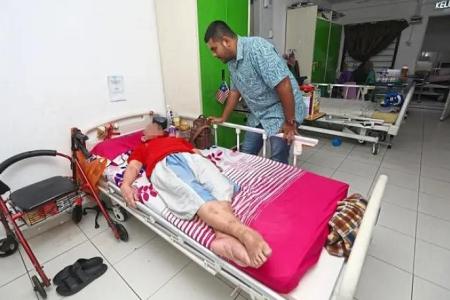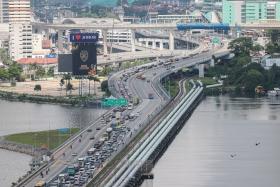More senior citizens abandoned at Malaysia hospitals
KUALA LUMPUR – Mr Ah Chong, 70, (not his real name) was suffering from dementia and in need of medical attention.
Concerned neighbours admitted him to Hospital Kuala Lumpur (HKL) for treatment.
He could not recall his name. Neighbours could not find his identification card nor did they know his next-of-kin.
When it was time for him to be discharged, the hospital’s Social Work Department stepped in to investigate his background as he needed aftercare and could not live on his own.
Mr Ah Chong’s fingerprints were sent to the National Registration Department (JPN) to find out his identity and trace his family.
Due to bad blood with their father, Mr Ah Chong’s children, when contacted by the authorities, refused to care for him, but agreed for him to be sent to a welfare home.
Today, two of Mr Ah Chong’s children occasionally check up on him at the home.
This is not an isolated case as hundreds of patients are abandoned by their families at government hospitals.
These abandoned seniors are occupying hospital beds that are in high demand as there is a long list of patients in need of medical attention and awaiting admission.
HKL Social Work Department chief Zulhan Ambi said the statistics of patients being left at HKL showed an upward trend each year.
In 2023, the hospital recorded 358 abandonment cases, and 166 cases up until May this year.
Of the 166 people, 139 are men and 27 are women. Chinese make up the most of the cases, with 66, followed by Indians (51) and Malays (43).
“In most cases, these patients are admitted by passers-by and were often sent to HKL by ambulance,” he said.
“When it is time for them to be discharged, they tell us that they have no relatives.
“These are old people as well as patients with disabilities who require continued medical care and support.”
Some 50 per cent of the cases involve patients above the age of 60 while the remaining ones are younger people with medical complications.
Mr Zulhan said 90 per cent of those abandoned would claim they have no family.
In such instances, the department’s officers would work with JPN to learn more.
He said this was not his department’s main function but the service was extended to help those who were left to fend for themselves.
Mr Zulhan said at HKL, the oldest patient with no one to turn to was an 80-year-old man.
Most of the patients, he said, were also disowned after family feuds, divorced or those with HIV, Hepatitis C or drug issues.
“My officers work very hard to locate families and follow up by persuading them to take the discharged patients,” he said.
“Most of the time, welfare homes do not accept patients who have no next of kin.
“When no one wants to care for these seniors, the officers will get relatives’ consent for the patient to be accepted into a welfare home.”
Pusat Jagaan Mahmudah Malaysia in Semenyih, Selangor, was formed in 2016 to address patient abandonment.
The home is managed by welfare organisation Persatuan Kebajikan Mahmudah Malaysia.
Association secretary Muhammad Syafiq Mohiadin said the home received at least one call a day from hospitals around the country to shelter abandoned patients.
At present, the home has 47 people who were either abandoned or whose families could not care for them due to financial problems.
Mr Muhammad Syafiq said the residents were aged between 38 and 90.
“They are mostly people with disabilities, single and without next of kin, or are ill and in need of medical attention as well as being bedridden.
“Most of them have non-communicable diseases and need regular medical check-up,” he said.
Mr Muhammad Syafiq said most homes were reluctant to accept the bedridden because they required a lot of medical attention.
Pusat Jagaan Mahmudah, he said, had 15 full-time staff and good amenities including hospital beds.
Cost is also a big factor. Mr Muhammad Syafiq said welfare homes needed financial support for their operational costs.
“Our monthly operational cost is RM65,000 (S$18,710). We depend on donors and fundraising activities to sustain the home,” he said.
On the makeup of residents, Mr Muhammad Syafiq said they were not always from poor backgrounds.
He cited a case of an old man who was sent to the home only for the staff to discover after his death that he was a Tan Sri.
“He was a wealthy man but due to a family feud, no one came for him until after he died,” he said.
“Sadly, the family only came to collect his death certificate so they could looking into matters relating to his estate.”
Poverty, disagreements over inheritance and family feuds were among reasons for seniors being abandoned at hospitals, he added.
“Some of our residents left their children and families when they were young, hence their offspring do not want to be associated with their ailing and aged parent.
“Some are from poverty-stricken families living in People’s Housing Projects (PPR) who cannot care for an ill and elderly person.
“Adults work long hours to make ends meet and cannot tend to the senior and take care of their children at the same time,” Mr Muhammad Syafiq said.
To tackle the issue of senior abandonment, he said government intervention was needed, either through the introduction of a specific policy or even an Act of Parliament.
Mr Zulhan said it was a blessing that non-governmental organisations and government welfare homes were providing shelter to people in need.
He said there were no formal procedures set by the authorities to deal with abandoned patients.
“Some of these patients also die at the hospital while the process of locating their next of kin is ongoing,” he said.
“If it is a crime to dump babies, then there should be laws to protect vulnerable seniors too.”
The United Nations has projected Malaysia to become an ageing nation by 2030 with 15 per cent of its population comprising people over 60 years of age, hence the urgent need for a deeper look at senior care. – THE STAR/ASIA NEWS NETWORK
Get The New Paper on your phone with the free TNP app. Download from the Apple App Store or Google Play Store now


